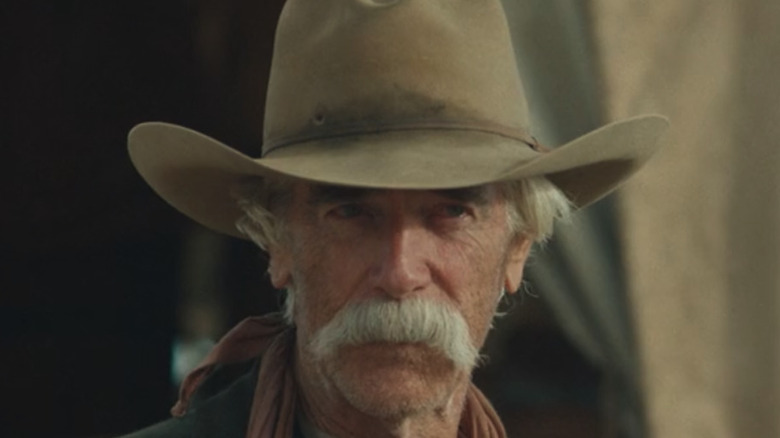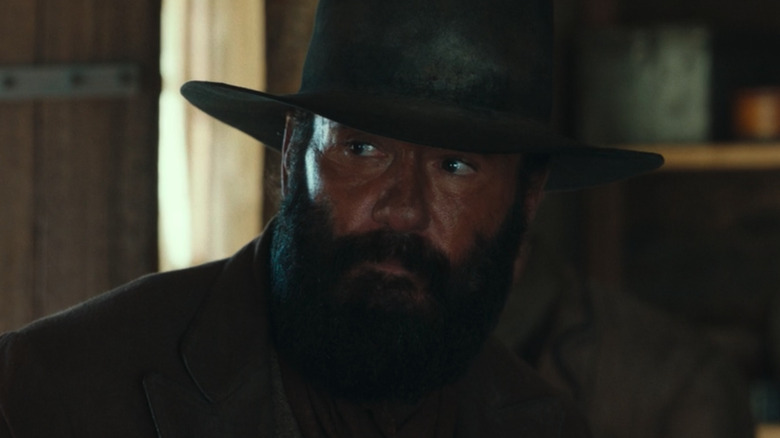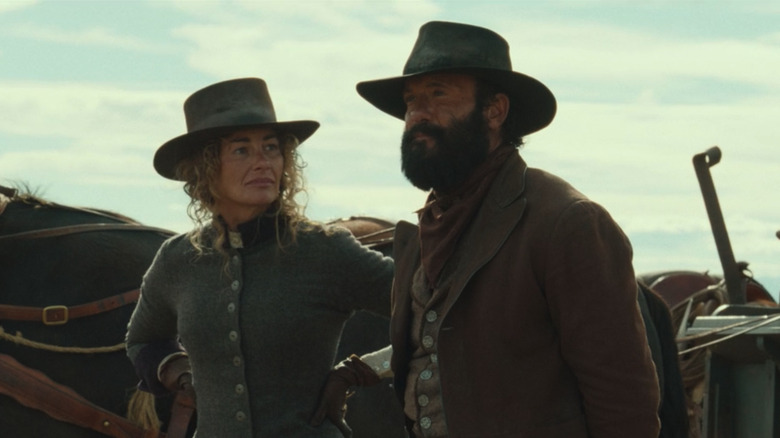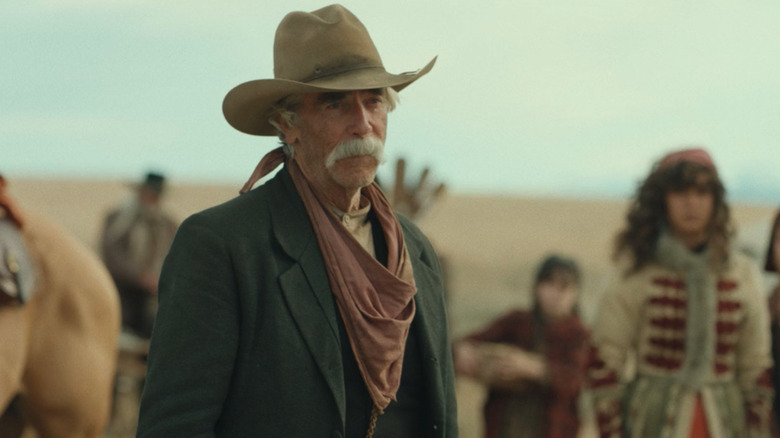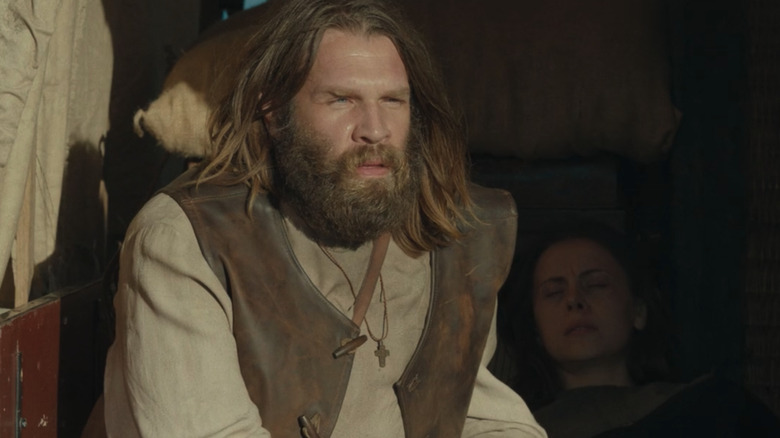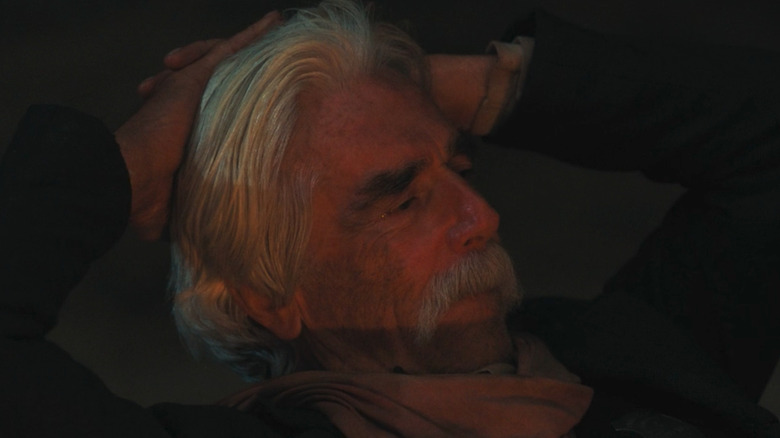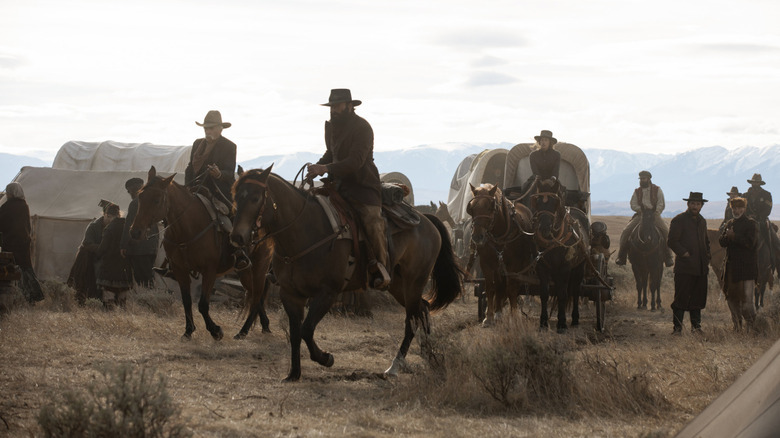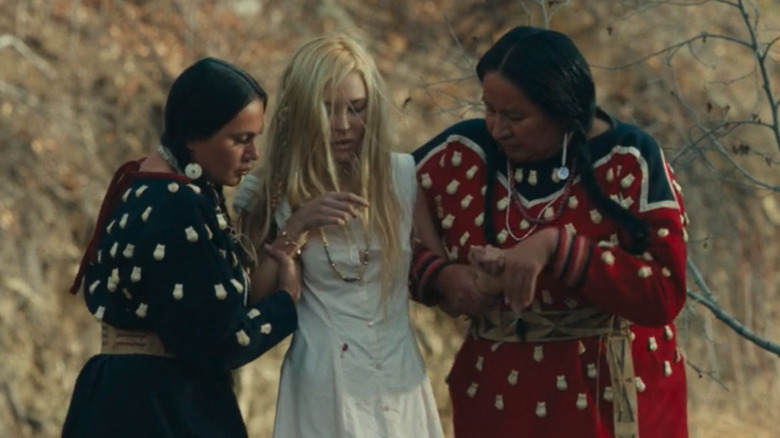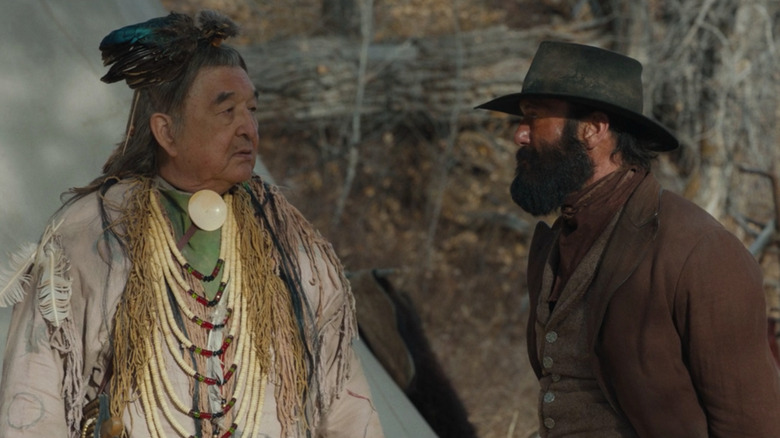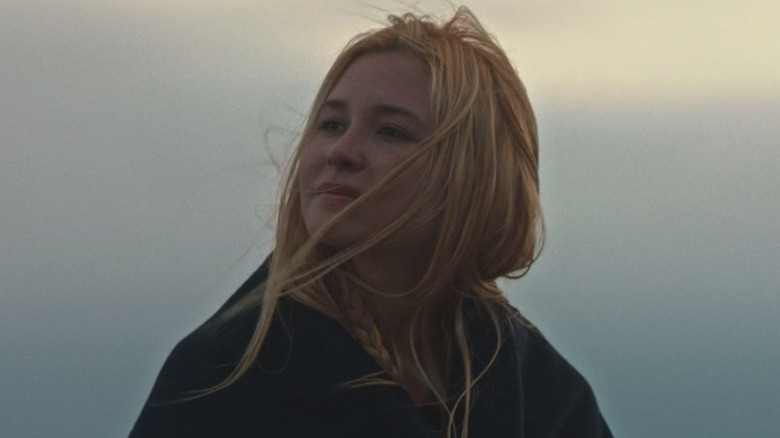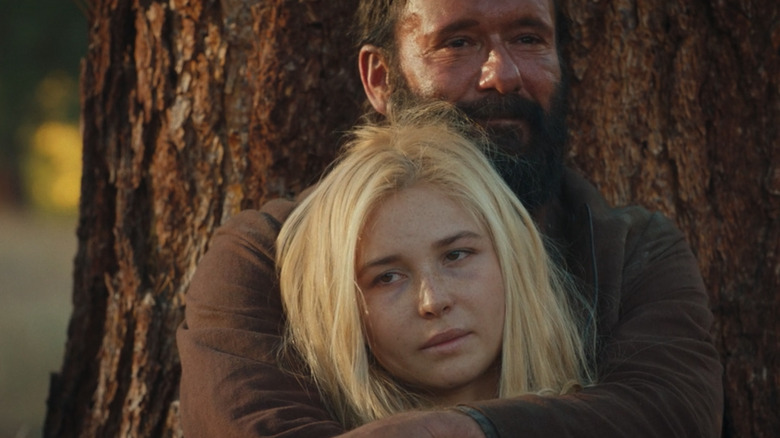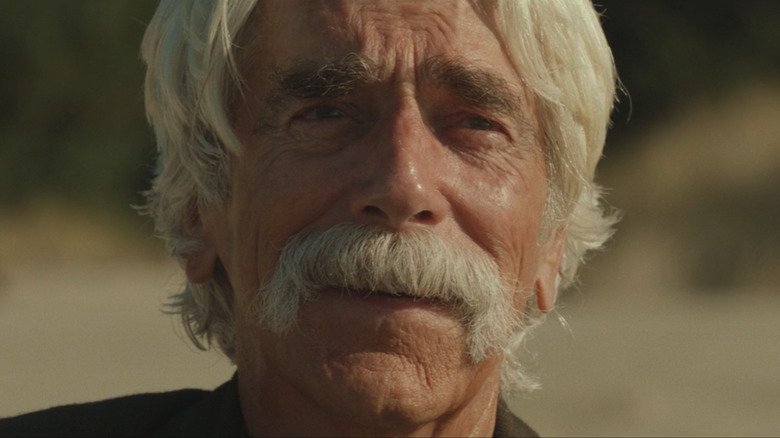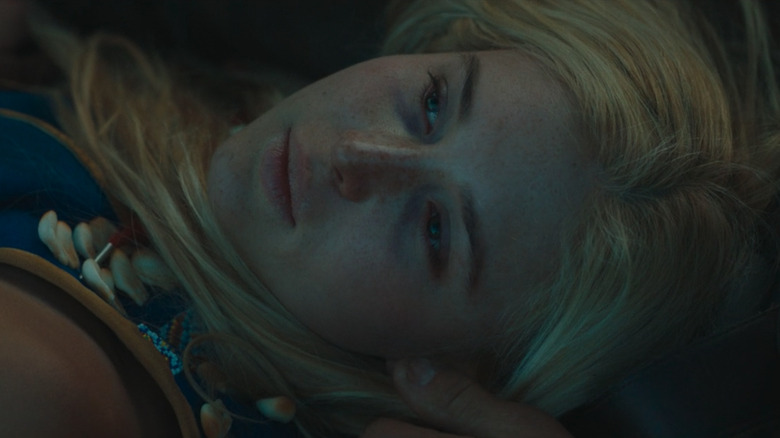The Ending Of 1883 Explained
The spin-off of the hit series "Yellowstone" from creator Taylor Sheridan, "1883" launched in December of 2021 to plenty of excitement for fans of the neo-Western. Set more than a hundred years before "Yellowstone," the series starred Hollywood legend Sam Elliott and country music duo Tim McGraw and Faith Hill, and showed how the Dutton family arrived in Montana and founded the Yellowstone Ranch before the turn of the century.
With few direct connections to "Yellowstone" outside of the Duttons themselves, the series saw Elliott's Shea Brennan teaming up with the Duttons to help a wagon train of migrant settlers make their way north along the Oregon trail. A slower, more sobering show that lacked the politics or family drama of its predecessor, it made its mark with an impeccable cast and dramatic stories of survival on the American frontier — and unexpectedly led by relative newcomer Isabel May as James' young daughter Elsa.
The conclusion gave satisfying closure to all of its main characters and wrapped up the story of how James Dutton and his family reached the big sky of Montana. So what did it all mean, and what did we learn in the final episode? This is the ending of "1883" explained.
A failed fort visit
With Elsa seriously injured from the wound inflicted by the Lakota in "Racing Clouds," James and Margaret take her to the nearby fort to see a surgeon. The wound wasn't healing, and they suspected infection, so it seemed like the only course to take if she was going to survive. With Josef and his wife also sick and injured, Shea agreed, and at the start of "This Is Not Your Heaven," they arrive at what could barely be considered a fort: A small wood and stone structure guarded by two teenaged soldiers.
But when they call on the surgeon what they get is Major Hemphill, who has no staff and no nurses. He tells Shea and Thomas that there is nothing he can do for her, and that what they thought was their salvation is little more than a meeting place for ambitious railroad engineers mapping the region. After examining Elsa, the Major reveals that the arrow that struck her hit her liver, and even if she does manage to survive the wound, she's already gone septic. Her best chance, he says, is to get her to Fort Laramie. But not to save her life, but so that she can be made comfortable enough before she dies.
If they're lucky, he says, she'll be able to regain consciousness so they can say their final goodbyes. At this point, it seems the hope that fans had pinned on Elsa's survival the previous episode were for naught, crushed by the Major's sobering words.
Divided over the truth
When they realize that Elsa's arrow wound was not healing, James and Margaret clash over what they should tell their daughter about her situation. Elsa was drifting in and out of consciousness and remained steadfast that she would recover, and her mother didn't want to break that belief. Margaret wishes to spare her daughter the grim reality, wanting to fill her with hope instead of fear. James, meanwhile, believes in his daughter's toughness and spirit, and wants to be straight with her about the seriousness of her wound rather than spare her the truth.
Now, with it becoming more and more clear that their daughter likely won't survive, there's tension between James and Margaret. It's unspoken, but James is clearly frustrated that he can't tell Elsa the truth, and that she may die without ever being able to say goodbye. Margaret, meanwhile, is still holding on to the last vestiges of hope that Elsa might recover. She wants to hide the truth from her as long as she can, telling Elsa that she is doing well on her road to recovery. She even reassures Elsa that her fever has broken, and she's looking better — upsetting James, who knows that his daughter is slowly dying. But even when confronted by Elsa herself, James goes along with his wife's insistence that they lie to her.
Diverting to the valley
When "1883" first started, many fans of "Yellowstone" must have scratched their heads when they learned that James Dutton wasn't traveling north to Montana, but was instead joining a wagon train that was headed to Oregon. Audiences knew that they'd be diverted, or stop short in Montana, at some point, and began theorizing how and why it would eventually happen. We finally discover the reason in the finale.
With the Fort offering little help for Elsa, and the next destination too far to reach in time, James and Shea decide they must make drastic changes to their travel plans if they're to give Elsa the proper resting place. The journey that was destined to end in Oregon will now divert to the Bozeman Valley in Montana, where he tells the group they will spend the winter before departing for Oregon in the spring. With their numbers dwindling, Elsa dying, and Josef and his wife unable to travel, it seems the best and only option for survival.
Unfortunately, the rest of the group is adamant that they continue on to Oregon, with or without Shea. The grizzled war veteran promises he'll still get them to Oregon, but they insist on continuing — with or without him. Shea cautions that without his help they won't survive the journey, but their minds are set. "Yellowstone" fans now know why the Duttons settled in Montana, and it was due to a tragedy few saw coming when the series began.
Josef chooses his fate
As the rest of the wagon train departs for Oregon on their own, Shea stays behind with James Dutton and his family, preparing to begin their journey to the Bozeman valley. Shea releases the cattle, and lets cowboys Colton and Wade depart the wagon and train, who leave for parts unknown. Thomas, Noemi, and their children stay behind and decide to stick with Shea. The remaining question marks are Josef and his wife, who want to go to Montana — but Shea refuses them, saying they are too sick to keep up. Noemi demands they be allowed to join them, declaring to Shea that they are now free people, whether they live or die, and should be able to make their own choice. Noemi selflessly offers up her own services as driver of their wagon.
But as days drag on, and Josef's snake bite continues to worsen, they're forced to face the stark truth that he might not make it to Montana. Thomas then offers Josef a choice: They can amputate the snake-bitten leg, or he can die with it. Josef chooses the only real option, and Shea and Thomas prepare to become battlefield surgeons. Getting Josef drunk enough to pass out, they remove Josef's leg in a brutal surgery by firelight, to which the rapidly dying Elsa responds "good thing I didn't get shot in the leg."
Shea's origin story revealed
Following the surgery on Josef, Shea and James sit around a fire and commiserate while Margaret sings Elsa a lullaby. James relates the promise his wife made to sing at his funeral one day, and that she also made him paradoxically promise to outlive her. But it's Shea who tells the most revealing story of the night, as he finally opens up about his past, and how his wife helped him survive the Civil War.
According to Shea, his wife back home had sent him a letter explaining that she was leaving him for another man, prompting him to leave his unit and return home with the intent to kill his wife's new lover. But when he got there, it turned out to be a ruse designed to get him to leave the war, ultimately saving him from death on the battlefield at Gettysburg, and reuniting the couple.
It's a touching story, one that gives new meaning to Shea's longing for the family we saw him leave behind in the premiere episode. The story illustrates the sadness in Shea's past, and the passion that drives him throughout the series. It also helps explain the respect he has for James and his relationship with his wife and daughter, and the love he sees in their eyes for each other, proving that he's more than just a battle hardened war veteran.
Doomed decisions
The settlers' decision to proceed to Oregon without Shea was met with derision from Brennan, who warned them they would die if they attempted to go it alone. He insisted that their best hope for survival was to spend the winter in the valley and set off for Oregon in the spring, but the remaining group had had enough of Brennan's delays. Even with his protection, he had gotten many of them killed crossing a river, with more dying due to accidents and in attacks from Native Americans and bandits. It didn't seem like he was helping them anyway, from their perspective.
The settlers also felt that at this point in the journey, the trail was well marked enough that they didn't need him as a guide, and that they could find their own way without him. That would prove to be a fateful decision, and one that would quickly doom them after leaving Brennan behind. Not long after splitting up, a group of bandits attacked the wagon train, looting it, and killing everyone they found. It was another grim reminder of the lawlessness and brutality of life on the plains, and the dangers that lurk around every corner. They came to American shores with dreams of freedom and prosperity, and here in the end they wound up meeting their fate at the business end of an outlaw's pistol.
Unexpected aid
Though all hope seems lost for Elsa as James, Shea, and the rest of the remaining group take her north towards Montana to die, they have an unexpected run-in with a group of welcoming Lakota tribe members. The leader of the tribe, an elder named Spotted Eagle, sees that Elsa is in rough shape from an arrow wound and says he has a doctor of sorts in his own group that may be able to help her. After days — or longer — injured on the tail, Elsa finally gets proper attention for her wound, in the form of two women who take her to a nearby stream to flush out the infection.
At last, audiences may have believed this was the moment when things would change for Elsa, and she might finally be saved. It would have made thematic sense if she were healed by members of the Lakota tribe — the same tribe that has seemingly accepted her into their community. Unfortunately, the prognosis wasn't any better here than it was at the fort. The leader of the tribe says the Lakota coat the tips of their arrows in cow manure to ensure that their victims are killed by infection if not from the wound itself. Despite their medical attention and a spiritual ceremony, it seems that there was truly no saving the young Elsa Dutton.
Advice ... and a warning
Having accepted his daughter's fate, James Dutton tells Spotted Eagle of his intention to take Elsa into the mountains to die. Wherever Elsa lays, he says, is where he and his wife plan to lay claim, build a ranch, and call home. But he does not know this region, and fears it will not be hospitable to him. In response, Spotted Eagle offers him advice on a good place to start his new life. "I know a place for you," he says, pointing him to a valley up the river. "I used to hunt that valley as a boy. The winters are cruel, but the summers are rich, and a man who plans can thrive. And you look like a man who plans."
Spotted Eagle says it is called Paradise Valley, which fans of "Yellowstone" will recognize; it is indeed the name of the real life valley where the series is set. It's also the name of a capital investment firm, run by Dan Jenkins, that tries to push the Dutton's off the Yellowstone more than a hundred years later.
But advice on where he'll found the Dutton-Yellowstone ranch isn't all that Spotted Eagle offers. He gives him a prophetic word of warning as well — telling him that in seven generations, his people will rise up to reclaim their land. The one thing he asks of James, however, is permission to continue hunting in the valley, which he happily accepts. This also explains James' kindness towards a small tribe we saw him meet in the flashbacks in "Yellowstone," as he owes them a great debt for helping Elsa and pointing them to their new home in the valley.
A life fully lived
Finally realizing that she is not getting better and is going to die, Elsa feels betrayed that her father lied to her. All she asks of him now though is that she be able to choose the spot where she is to die. James grants her request, as Margaret watches from a distance, distraught that her daughter has to face the truth of her own demise. But it's once again wisdom from Shea Brennan that helps James come to terms with Elsa's impending doom: The veteran soldier consoles him with the fact that Elsa lived a full life, fuller than most, despite her young years.
In fact, Shea says, despite his 75 years on this Earth, Elsa may have lived even more than he did. She lived more, laughed more, and loved more. "She outlived us all," he says with a slight knowing smile. Elsa had a happy childhood, a loving family; she traveled the plains, rode as a cowboy, joined a wagon train, saw the beauty of the land, the big sky, and the many different people who lived under it. She clashed with Lakota and she battled bandits; she fell in love more than once and was loved back. Elsa had indeed lived the American Dream, and death was now the last destination on her short journey through life.
An ancestral claim revealed
In "This Is Not Your Heaven," fans of "Yellowstone" finally the significant connections they'd been looking for all season long, and learned important new details that give greater meaning to elements in the prior series. We learned what brought James Dutton's journey from a path to Oregon to founding the Yellowstone Ranch, and after years of hints and references to family legacy, we finally understand the spark that ignited the Dutton's passion for their home in Montana.
In an early part of the episode, Elsa muses to her father that the only thing she fears about death is being forgotten. James and Margaret vow that if she's to die, they will make their home where they bury her so they can visit her grave every day, and she will be remembered. When Elsa chooses the spot where she is to die, by a tree near where the ranch is to be built, audiences finally understand the Dutton's ancestral claim to the land. We've heard John Dutton's promise to his father not to let the land go, and now it seems it's a promise handed down from generation to generation, originating with James' vow to make a home by his daughter's grave.
It seems the Dutton's claim to the Yellowstone Ranch stretches back to 1883, with the death of Elsa Dutton. While her descendant John Dutton refuses to relinquish it, not for money or anything else, it remains to be seen if Spotted Eagle's prophecy that his people will one day reclaim it is true.
Final goodbyes
Once Elsa passes away in her father's arms, the story flashes forward one year. While we do not see James and Margaret in their new ranch, we do get updates on the surviving cast. Josef is seen on crutches, his right leg amputated, as he removes his wedding band — presumably because his wife has died. He pulls a stack of wood planks from his horse, and we're left to believe that he is building his new home in a valley. He is the lone survivor of his group, but he has finally found the home he set out to build when the series began.
We then cut to Willamette Valley, Oregon and see Noemi and Thomas staking a claim on a plot of land, theirs near a river. Noemi's two children rush to embrace her. This is especially meaningful, because earlier we learned that her children had not spoken to her since they had blamed her for the death of their father. But now they are building a home and a life with Thomas, in Oregon as promised.
Finally, we see Shea, on a beach, looking out over the water. He speaks to his late wife Helen, admiring the beauty of the Pacific Ocean. Having completed his journey, and seeing nothing left to hang on to, Shea ends his own life while sitting on the shoreline. Whether heartwarming or devastating, the ending of "1883" won't leave a dry eye in the house.
If you or anyone you know is having suicidal thoughts, please call the National Suicide Prevention Lifeline at 1-800-273-TALK (8255).
Ultimately, a story of hopelessness
When the series began, audiences may have suspected that "1883" would be a series very much like "Yellowstone" — a high octane drama full of action and suspense. Set in the Wild West, it seemed like the perfect place to put the series' first spin-off, and surely fans dreamed of rough-riding cowboys chasing down bandits in a fast-paced western adventure, starring John Dutton's ancestor as a sharp-shooting gunslinger.
But when it premiered, viewers were instead treated to a somber and emotional drama — a slower, more intimate look at life on the frontier than they may have expected. And while James indeed played a central role, it became clear right away that it would be Elsa Dutton's story, as she narrated her journey north from Texas. An unexpectedly subdued premiere episode gave way to a series that provided background to "Yellowstone" while telling its own story that required no prior knowledge.
But perhaps the most surprising thing about "1883" is that it wasn't the story of hope and discovery that many may have thought, as the Dutton's embarked on a voyage to Oregon. Instead, the series was ultimately a bleak tale of the hopelessness and sorrow felt by so many as they ventured out onto the frontier. Though there are moments of joy to be found, even those are bittersweet, as so many of the series' characters met untimely ends, some from the most ordinary of circumstances, illustrating that every element of early American life was fraught with danger and death.
